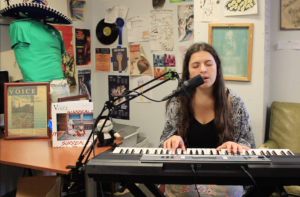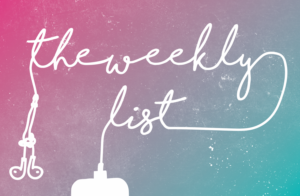Content warning: This article includes references to sexual violence.
“Do you really think I give a damn what I do after years of just hearing them talking?”
The question kicks off Lana Del Rey’s new single “A&W,” which explores themes familiar to fans of her first album, the now-critically heralded Born to Die (2012): obsessive love, artistic journeying, drug use, relationship abuse, physical beauty, mental conflict, sex, Americana. This time, though, her voice is new. She’s more confident and assertive, less coy and world-building. As one listens to the same theses she delivers time and time again, Lana Del Rey’s persona disappears, replaced with the more human and less movie star Lizzy Grant. As the track delves into her childhood, early career, and the constant media frenzy around her personal life, these themes become the product of a newly uncensored woman. Lana sings the aforementioned line to all critics, professional and Twitter-based, past and present: Try to tell Lana who she is—she’ll gladly correct your interpretation.
“A&W” is the second single from Lana’s recently released studio album, Did You Know That There’s a Tunnel Under Ocean Blvd (2023). In a recent feature interview with Interview Magazine, conducted by Lana adorer and Grammy Award-winning singer-songwriter Billie Eilish, Lana detailed the album’s songwriting process: “I’d go on a seven-minute rant with a repetitive melody. It would be exactly what I was thinking about, mostly family and whether everything was going to pan out alright in the end.” Though not explicitly referencing this track, “A&W” is among the longest songs in Lana’s discography at 7 minutes and 13 seconds (second only to 2019’s “Venice Bitch” at 9:38, another Jack Antonoff co-written track).
The first section of “A&W” has the wordiness of a spontaneous rant as Lana referenced, with long lines lacking the syntactical selectivity of her earlier, more sparsely-worded tracks. Some lines even seem intentionally unedited: “I’m a princess, I’m divisive / Ask me why, why, why I’m like this / Maybe I’m just kinda like this / I don’t know, maybe I’m just like this.” Yet, the lack of editing fits with the song’s candid themes and defensive attitude. The casualness almost begs critics to take offense.
The lackadaisical editing presents a woman who’s given up both musically and romantically, a theme often expressed in the song. From somber California namedrops—“I’d say I live in Rosemead, really I’m at the Ramada / It doesn’t really matter”—to the song’s ultimate climax—“Yeah, I know, I’m over my head, but oh / It’s not about having someone to love me anymore”—Lana, who often shunts society with her version of self-empowerment, has now found comfort in allowing herself to give up on self-satisfaction and love. If she can’t have what she wants then her art will be entirely her own, and both art and person will be unrefined.
Towards the end of the song’s first portion, Lana sings, “Look at my hair, look at the length of it there, and the shape of my body. If I told you that I was raped do you really think that anybody would think I didn’t ask for it?” The lyric sticks out not because she addresses sexual violence, which is a typical topic in Lana’s songs, but because the treatment of sexual assault here is more blunt, less poetic, than in the past.
Critics attacked 2014’s highly controversial track “Ultraviolence” for the lyric, “He hit me and it felt like a kiss.” Already distrusting of Lana’s authenticity for adopting a character in her music, they disapproved of the contorted reaction to sexual abuse. Some claimed she was glamorizing domestic violence, perhaps for controversy and commercial gain. Lana has insisted that the lyric reflects her negative mental state during past relationships and does not glamorize an inauthentic or fictionalized experience. Later that year, a music video for a Marilyn Manson song broke the internet, featuring Lana acting out a rape scene. Critics doubled down on Lana for her involvement (Manson is currently being investigated for several sexual abuse allegations).
Now, in a stripped-down song which sheds persona altogether, the topic is treated with an unfamiliar weight. It critiques societal perspectives of women who dress a certain way or sing about longing romantic desire, while bringing Lana’s dealings with sexual violence out of any guise of persona-hood. Critics can no longer delegitimize Lana’s lyrics for fitting an industry-crafted, anti-feminist character. It’s time to look at Lana as a real person and listen to her story, as we should have done throughout her entire career.
The second section of this song vastly contrasts the earlier part, sonically and lyrically. The soft guitar is dropped in favor of a low electric bass beat and disjointed, electronic sounds. Long sections of instrumentation get gradually darker and more hip-hop influenced, as if the listener is journeying into the backstory of Lana’s current lethargy and can see the emotionally charged moment preceding it. The lyrics become cryptic and confused—a tangled web of sounds, accented phrases, and a name: Jimmy.
Genius quotes the lyrics as “Jimmy, Jimmy, cocoa puff, Jimmy, Jimmy, ride / Jimmy, Jimmy, cocoa puff, Jimmy, get me high / Love me if you live and love, you can be my light / Jimmy only love me when he wanna get high.” Though the storyline is not easily decipherable, Lana’s love interest clearly isn’t matching her level of affection (or her affinity for pet names). Instead, the story revolves around Jimmy’s desires and drug habits. Listeners could surely see this uneven relationship leading to Lana’s numbness from earlier in the song, and this surprising backstory adds energy to the otherwise slow, poetic track, forming a complete sonic story.
“A&W” is no anomaly within Lana’s discography. The themes of the track have been oft-explored by the somber crooner, and the soft guitar and hip-hop influences are renewed from 2010-era albums. Even the title of the song itself is a flashback, abbreviating “American whore” to the root beer brand name “A&W,” a reference to her contentious 2012 track “Cola.” What’s new here are the unfurling, unedited lyrics, the absence of a wider cinematic universe, and the humanization of character. What’s new is that Lana is not presenting her experience through an established lens. She is no longer presenting as the Hollywood queen, the abused housewife, or the Western cowgirl. She is now a woman who is heartbroken, numb, and coping with it all through casual sex. She still sees herself through a lens, the “American whore,” but she doesn’t hide behind it anymore. She personifies it, shows the vulnerability behind the image. It’s not for us, though—it’s for herself: “I won’t testify, I already fucked up my story.”






From what I understand “Jimmy” is a recurring reference to… Nobody really knows for sure lol. “He” shows up in Ultraviolence “Jim raised me up/ he hurt me but it felt like true love” among others. I believe its a mixture of random men, one man in particular, alcohol and vices, and just general discontent with herself and others. This is what makes Lana Del Rey so exciting and dynamic as a singer/songwriter. She’s simultaneously cryptic and in your face straightforward. She writes for herself first and kind of has this vibe of “well, they’ll figure it out, or they won’t.. either way it’s my truth”. It’s charming and refreshing to me, as most writers want their songs to be so over the top obvious in meaning that it’s borderline (if not outright) insulting to the listener’s intelligence. I love love LOVE HER and will be a faithful fan until the fkin sun explodes.